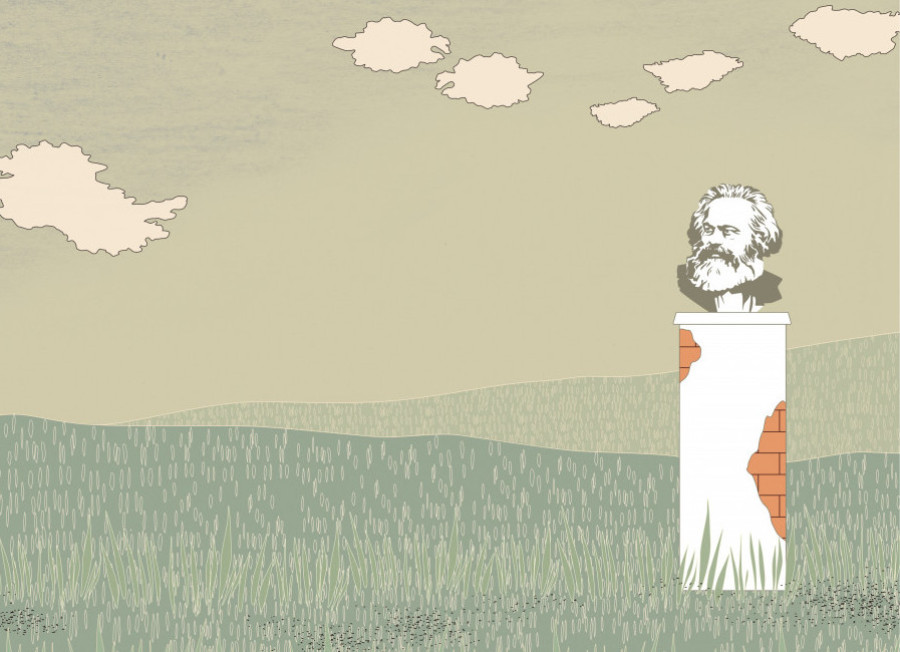Columns
Marx’s nightmare
The mode of governance in most communist countries is hardly distinguishable from fascism.
Naresh Koirala
In 1849, Karl Marx and Friedrich Engels published The Communist Manifesto. They predicted the demise of world capitalism and the victory of communism in one sweep. There would be no private property in a communist society. A communist society would be classless and stateless—every citizen would be equal and there would be no national boundaries, the boundaries would 'wither away'. The Internationale, a call for workers of the world to unite to overthrow tyrants across the globe, became the communist movement’s standard anthem.
The success of the October Revolution in 1917 brought the world's first communist-led government, the Soviet Union, to power. This was a bittersweet victory for the communists. They won, yes, but Russia is just one country. The sweeping demise of all capitalist states was nowhere in sight.
Undeterred, communists around the world got together in Moscow in 1919, and formed the Communist International (Comintern) to support 'struggle by all available means, including armed force, for the overthrow of the international bourgeoisie and the creation of an international Soviet republic as a transition stage to the complete abolition of the state'. Nationalist ideas were anathema to the Comintern. The transition stage would be a dictatorship under the leadership of the Communist Party. It would lead to an egalitarian global society where everyone’s needs would be met; everyone would be equal and free, and there would be no national boundaries.
The Unending transition
By the 1990s, 17 countries had communist regimes, but the ideas of communist internationalism and the 'withering of the state' were long dead. The Internationale had been conveniently forgotten. National boundaries had hardened. The border wars between the Soviet Union and China in 1969, and China and Vietnam in 1979 attest to this. In late 1989-90, all communist governments except in China, Cuba, Laos, North Korea, and Vietnam (the Five) imploded. The Five have now been in power for 60 years or over, but the end of their transition is not in sight. The transition has become permanent and a useful tool for communist leaders to perpetuate their power and to accumulate wealth.
Kim Il-sung, the founder of North Korea, used his totalitarian power to establish a ruling dynasty of the Kims. The country is currently run by the third generation Kim and is among the most brutal dictatorships anywhere. It is also the poorest and one of the most corrupt countries in the world. Fidel Castro ruled Cuba for 46 years until he died. About two years ago, Xi Jinping, the president of China, amended China’s constitution allowing himself to be president for life.
The mode of governance in most communist countries is hardly distinguishable from fascism—totalitarian one-party state; hard nationalism; controlled press; oppression of opposition; private but controlled economy. Income inequality and debilitating corruption at all levels of government have been a communist regime’s hallmarks. The disparity in the net worth of the Chinese people rivals that of the United States. China is also known to be one of the most corrupt countries in the world.
Nepal’s communists
Amid this depressing track record of communist governance from around the world, the Nepal Communist Party came to power in 2018 winning an overwhelming majority in the country’s parliamentary election. The Nepal Communist Party was formed in 2018 after a hasty electoral alliance of Nepal’s two major communist parties before the 2017 parliamentary elections. Both parties had declared their commitment to parliamentary democracy when their insurgency, launched at different times, failed to capture power. The alliance was a desperate strategic decision to stay relevant and win the impending election. It worked.
The alliance’s victory spoke of Nepali people's fatigue with the lacklustre performance over the years of the centrist traditional Nepali Congress and its incumbent ever-feuding leaders. People hoped the combination of the communist idealism and democratic ethos 'embraced' by the alliance would render a government focused on the public good. Unfortunately, this was not to happen.
Contradictions, corruption and warring egos of its leaders have marred the Nepal Communist Party’s nearly two and a half years' performance in government. The party’s governing style is not much different from that of a majority of other communist governments, minus, thanks to our democratic constitution, the 'transition governance' and the associated human rights horrors. Other than this, under the watch of the Nepal Communist Party, public corruption has reached a new low. Despite the measly economic progress, it is widely believed the Nepal Communist Party leaders and their associates have made lots of money, and become part of the small nouveau riche class.
The party professes to have embraced democratic values, but its school department eagerly studies Xi Jinping’s thoughts. The Chinese Communist Party provides ideological and tactical training to its cadres. This includes training on the relationship between the party and the government.
As I write this, Nepal is going through an unprecedented crisis due to the mismanagement of Covid-19, a collapsing economy, devastating monsoon floods and unchecked corruption at all levels of the government. But this crisis is not what is occupying the Nepal Communist Party leaders. The two co-chairs of the party, Prime Minister KP Oli and Prachanda, are engaged in a bullfight which has paralysed the whole party and the government. Prachanda has called on Prime Minister KP Sharma Oli to resign from both posts. The reasons for the call are not clear. They look and sound like a clash of egos and seem to be nothing more than the competing ambitions of Oli and Prachanda. Why? Because Oli’s performance or the crisis the nation is facing is not even on Prachanda’s agenda.
Marx envisioned an egalitarian society where citizens would be free and care for each other, and where political power would be in the service of the people. He must be having nightmares watching communist governance, past and present, around the world—the unending transition and its horrors (except in Nepal), the insatiable lust for power of leaders who call themselves communist and pretend to take inspiration from the Manifesto, the inequality, and the pervasive corruption in the so-called communist countries. Life can be cruel even in death.




 8.26°C Kathmandu
8.26°C Kathmandu















